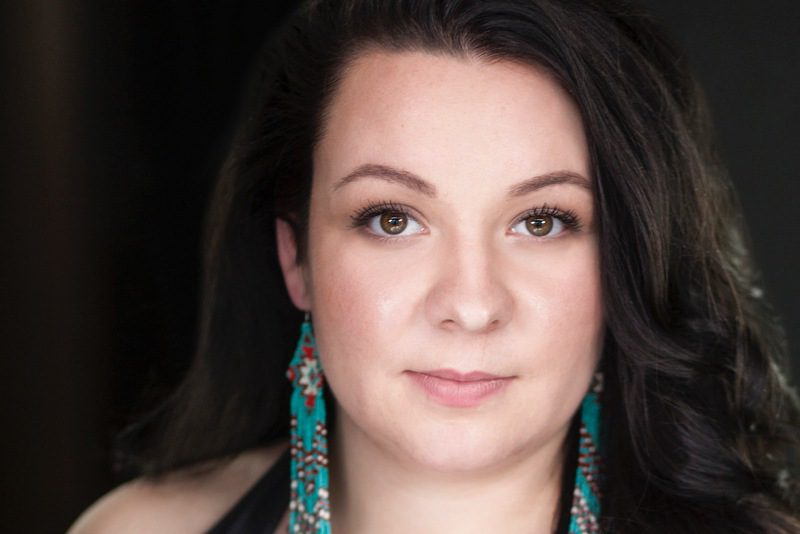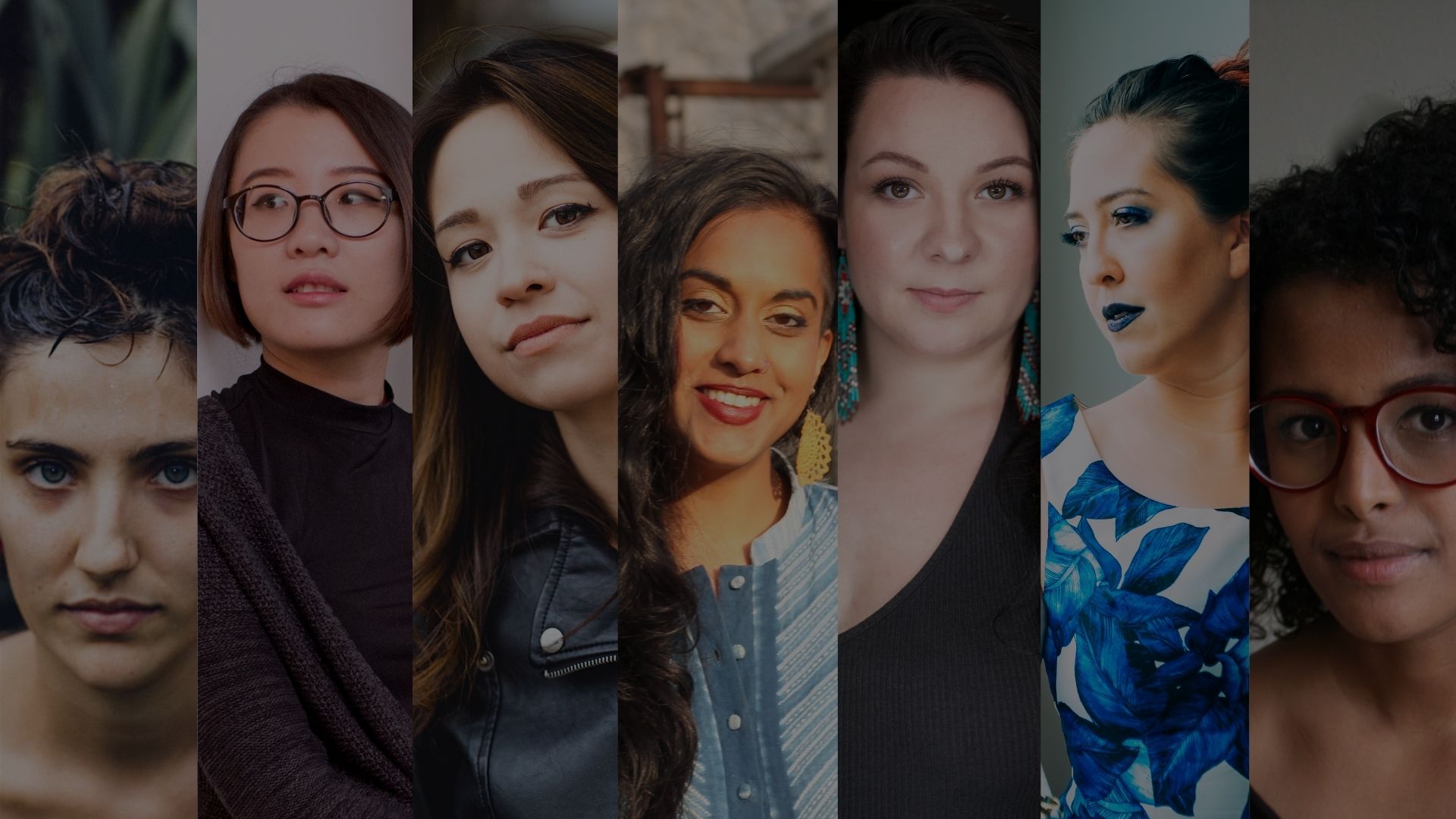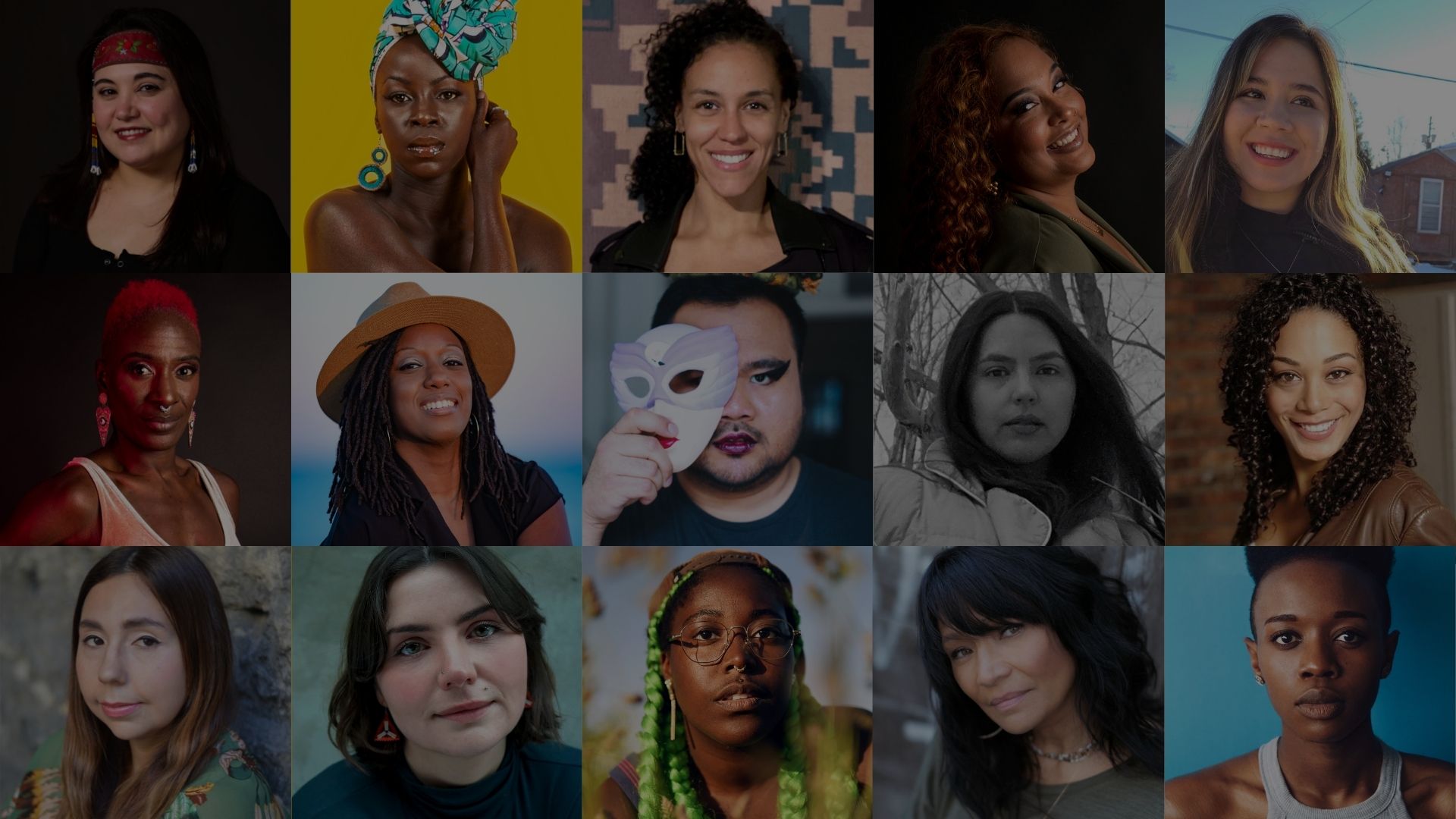TAI: Yeah.
RIMAH: Tai, I would like to ask you about the ThisGen Fellowship. First, how did you hear about it? And what did you have in mind when you first started the program?
TAI: Well, I heard about it from my mentor, Christine Quintana. She sent it to me in a group of emerging artists. And it’s so funny because I think I applied for the ThisGen Fellowship almost a year ago, and the world was in such a different place, obviously, because of COVID and everything. And so, when I initially applied, I just kind of wanted, I wanted help essentially figuring out how to shop my work around — because that’s kind of the point I’m at as a creator — where I’m starting to bring people together to make it happen. And I got the phone call about what we were gonna do for the ThisGen Fellowship while I was in London, Ontario doing Tara Beagan’s “Honour Beat”, I was playing Mom. And I was in London, Ontario at the time, and it was my last gig before COVID, and I remember Ravi, Miriam and I talking about what I wanted to do at the time. And, sorry, I’m going on a bit of a tangent — but my year looks so different than I thought it would at that time. So yeah. Yeah.
RIMAH: If you will look back now — if you look back at phase one, were there a lot of surprises in the way how things went?
TAI: Yeah, there were a lot of surprises, because at the time I wasn’t even thinking internationally yet. That’s something Why Not brought to me, which has been, like, a really excellent addition to my life. And I also was thinking — it’s so weird because COVID’s made my world so small, yet so big at the same time. And I’ve admired Lisa’s work for years, like, I’ve literally seen “Hot Brown Honey” three times, like three times, I just keep going. And I have like the Honey’s merch. I’m moving right now, so I have no idea where they are or else I’d pull them out, but I have earrings and I have the, like, “decolonize and moisturize” pins. And, so, when Lisa was brought to me, because of course, in phase one initially kind of looked like a bit of traveling, which of course then couldn’t happen, right? So when Ravi and Miriam brought the idea of Lisa forward to me, it was really exciting and in a way something I couldn’t have even imagined, pre-COVID.
RIMAH: Mhmm. This also was maybe challenging for Lisa as a mentor — you were a playwright, and you were commissioned to write many plays, you were awarded prizes, at the same time you were a creator, a performance maker, a performer, yourself. What was the focus of ThisGen Fellowship for you? And how do you see this program will benefit you in the future?
TAI: It was really incredible to learn from Lisa because, she brought her process of creating a piece, is much different than I have done it in the past. So to learn from that and, I see Lisa, she may not define it this way, but I see Lisa as someone who collaborates and creates with a very multi-disciplinary approach. Whereas my plays I’ve written have been me at my kitchen table, like, thinking.
[RIMAH laughs]
TAI: So that’s really, really broadened my idea of how you can create a piece, and birth the piece and everything. And also just hearing about the ecology in Australia and what Lisa has done as an Indigenous woman who has created and led an Indigenous show that’s become an international phenomenon. And hearing about Lisa, because the way I met Lisa initially was when “Hot Brown Honey” was in Vancouver, my mentor Margo Kane who runs “the Talking Stick Festival”, we actually had a big gathering with the Honeys, and then with us. And so, just hearing about Lisa connecting with Indigenous artists internationally and everything, that’s been really eye-opening, and really amazing. And also, it’s really kind of opened up my spectrum of how to create, and that it doesn’t necessarily mean me sitting at a table writing a play. Which is something I’ll carry forward with me.
RIMAH: There are multiple ways of writing, right?
TAI: Yeah, totally.
RIMAH: It doesn’t have to be typing words.
TAI: Yeah.
RIMAH: Tai, how you would like other people to see your work? This is part of a question I have because I wanted to ask you also do you see it as an advantage or disadvantage to be identified as a Métis female artist?
TAI: That’s such an interesting question because I’m honestly not even thinking about it right now.
[RIMAH laughs]
TAI: My life right now — I’m not — that’s so interesting, but I have, I mean, okay — so here’s my situation — I was living in Vancouver for six years where I went to school and I started working and I kind of built my network and who I want to be and things. And then I was a bit like, “I can’t write about my people and my stories without being at home.” So I actually moved home mid-March, and well, it was supposed to be April 1st, but all like, of course because of COVID, I got out sooner. And so I’ve spent the last five months really reconnecting with my place and my family. And I’m very fortunate in my life to still be best friends with the girls I grew up with. And so, to me when I think of what I want people to think when they see my work, I just want my own people to be proud. I don’t really care about anyone else. But what I would like them to know is that my focus right now is love stories, and really rediscovering make-shift perspectives of the sacred feminine. And another thing about that, is that makeshift woman’s stories have been forgotten and eclipsed by the men. They’re very, very not traceable. So when I think of what I want people to see when they see my stories, I just want people to remember my family and the woman who came before me that created Alberta and made it what it is today. And I want people to realize that we’re a people full of stories, and love, and song, and dance. But most of all, I’m doing what I’m doing, and I’m writing what I’m writing, because I believe that the woman became before me deserve to be remembered, I believe they deserve to have a written history, and I believe that they deserve to dance on our Canadian stages. And that is kind of my main reason for doing what I’m doing right now.
RIMAH: Hmm, that’s really interesting.
TAI: If people like it as a byproduct, cool. [TAI laughs] You know? Yeah.
RIMAH: Yeah I’m always torn between, when I create work, I’m always thinking, “what will people consider this as autobiography or will they consider it as just art?”
TAI: Yeah.
RIMAH: And I did the opposite of you, and I wanted to write about my home. I wrote the best when I was far away. [RIMAH laughs]
TAI: Oh, really?
RIMAH: Yeah. I mean, yeah. But I lived for a long time there — it’s not like I left when I was young. But do you see it as an advantage or disadvantage to be identified as a Métis female artist?
TAI: Oh, totally an advantage because I mean, my stories haven’t been told yet.
RIMAH: Mhmm.
TAI: So when I do things, people haven’t seen them before, and I don’t run — I feel like right now I’m in a really, really privileged place where I don’t run the risk of repeating myself.
RIMAH: Yeah.
TAI: Yeah.
RIMAH: That’s a good way to put it.
TAI: Especially our love stories. We’re just, because of all the work all the people before me have done, and my mentors have done, I’m now in a position where I can tell our love stories, just because, right? And so, yeah. It’s all very exciting, and sometimes it’s overwhelming, and it’s of course a lot of work, but like, I’m having a great time doing it, and I very much, so feel like it’s my purpose.
RIMAH: I’m very much intrigued, and I would love to see one of those love stories.
[TAI laughs]
RIMAH: When you come to Toronto, or maybe I’ll just come to Alberta.
TAI: Yeah, well, I was supposed to spend, like, three months of this year in Toronto, pre-COVID.
RIMAH: Yeah, we were supposed to do a lot of things this year.
TAI: Yeah, yeah.
RIMAH: Let’s hope for next year. Speaking of the future, and the years coming, what is your next project?
TAI: Well it’s actually very exciting — it was only announced two weeks ago, I think — but I’m an associate artist at the “Citadel Theatre” in Edmonton, and right now I’m adapting Stephen Massicotte play, “Mary’s Wedding” into a Métis love story. So if you know anything, “Mary’s Wedding”, is my one of my favorite plays ever. It’s about a young couple, Mary and Charlie. And Mary’s a British girl, in Canada, and Charlie is like a settler Canadian boy, and he goes off to war, and it’s this really epic love story, and right now I’m adapting it to be two Métis people from my home. And we’re into rehearsal at the beginning of November, and I’m playing Mary.
RIMAH: Really, really cool. So you play Mary and you’re writing Mary.
TAI: Yeah. Well, I’m adapting it right now. It’s pretty much that play. Stephen and I are having a big meeting this week about how much is gonna change, but, I’m like, I love that play. I’m just changing cultural markers and things and I think my body, and also Todd Houseman’s playing Charlie, and I think mine and Todd Houseman’s body will do majority of the work.
RIMAH: Hmm.
TAI: And underscoring with our sounds and things. Yeah! So that’s super exciting! And that’s like a dream; Mary’s always been a dream role of mine.
RIMAH: This will make me curious about where you get your inspiration when you create, or write, your work?
TAI: Yeah, a lot of dreams. And a lot of pretty boys who have crossed my path in real life.
RIMAH: Thank you very much for being with us, and I’m really very much intrigued by what you said about your work. And hopefully one day I’ll see you in person. I will attend one of your plays.
TAI: Yes!
RIMAH: Thank you.
TAI: Thank you.
RIMAH: That was ThisGen Podcast, created by Rimah Jabr. If you would like to know more about ThisGen Fellowship, please check Why Not Theatre’s website at whynot dot theatre. Thank you.






